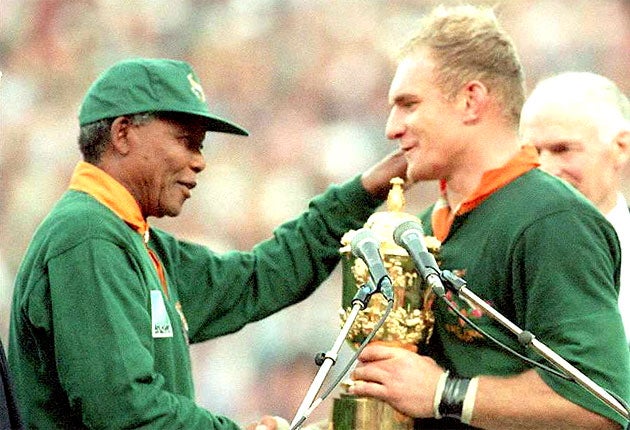Long road to the big screen
'Bokbuster' about Nelson Mandela raises questions of just how far South Africa has come

Invictus should probably win Oscars. Its star-studded cast is a "Bokbuster" gift to the marketing world. But in South Africa, the timing of Clint Eastwood's film about Nelson Mandela's ultimate charm offensive on sceptical whites coincides with a new debate about the actual achievements of reconciliation.
Last night, Morgan Freeman, 72, who has already won a National Board of Review's Best Actor award for his portrayal of Mandela, was in Johannesburg for the local premiere. He will be in Durban tonight and in Cape Town tomorrow. Later in the week, Freeman reportedly hopes to attend a private screening at the home of the frail 91-year-old former South African president.
Invictus is named after a poem by William Ernest Henley and based on Playing The Enemy, the non-fiction book by The Independent's former Johannesburg correspondent, John Carlin. The film marks the most ambitious cinematic attempt to portray South Africa's captivating racial narrative since films like Cry Freedom and A Dry White Season in the 1980s.
Set during the 1995 rugby union World Cup, which South Africa hosted just a year after Mandela became the country's first black president, its climax has the hero of the apartheid struggle embracing the Afrikaner- dominated sport and rallying fellow blacks to cheer to victory a national team whose colours and emblems had been seen as symbols of oppression.
It is hitting South African cinemas just a few days after the draw for the 2010 football World Cup was staged in Cape Town. In many ways, the country's successful World Cup bid marks the logical extension of the leap of faith Mandela inspired when he created one of the iconic images of the 20th century by donning the number six Springbok jersey.
Sport, race and the uncomfortable issue of South African identity are once again on people's minds. But Sowetan columnist Andile Mngxitama suggested the film will only please whites. "The rebellion against apartheid should not have been about rainbows – accommodating the 10 per cent of the population who were white – but about freedom for the majority of South Africans. They live in abject poverty today."
Aubrey Matshiqi, a political analyst for the Centre for Policy Studies, said the euphoria of the Rugby World Cup had overshadowed the inequalities that remain in South Africa: "We became the symbol of reconciliation, and this masked the reality of the lack of reconciliation among people.
"There is a perception that it is almost always the black person that extended the hand of reconciliation. To some extent white people embraced Mandela but not the race from which he came."
Statistics published by Absa bank at the weekend bear out the criticisms. The growth in wealth among black South Africans since the first all-race elections in 1994 has been relatively modest. Of 400,000 South Africans who earn in excess of 600,000 rands per year (£48,000), only 18 per cent are black. More than half the population still earns under 20,000 rands (£1,500) per year.
Sport has also largely failed to transform itself. In the 1995 final, against the All Blacks, one of the players was black; Chester Williams. By the 2007 final the number had risen to two. Apart from in the Eastern Cape, a province where blacks have always played both cricket and rugby, the higher echelons of those sports remain largely white. Even in football – a "black" sport – whites appear over-represented among the coaches and administrators of the Premier Soccer League.
Invictus looks at a time when the country's survival was seen as dependent on the mood of 10 per cent of the population. The debate in South Africa has moved on.
Nevertheless, the film may provide a lifeline for the embattled springbok on the South African rugby jersey. Last year, loose forward Luke Watson said the sight of the gamboling gazelle made him "feel like vomiting" because of its association with rugby under apartheid when the springbok was the sporting symbol of the National Party. Asad Bhorat, the president of Soweto Rugby Club, said the continued use of the springbok is "akin to the German national team wearing the swastika". In the end, the sports ministry and the South African Rugby Union compromised: the springbok was moved to the right-hand side of the jersey, replacing a sponsor's logo, and the King Protea flower – also the symbol of cricket – was stitched to the left side.
Join our commenting forum
Join thought-provoking conversations, follow other Independent readers and see their replies
Comments
Bookmark popover
Removed from bookmarks